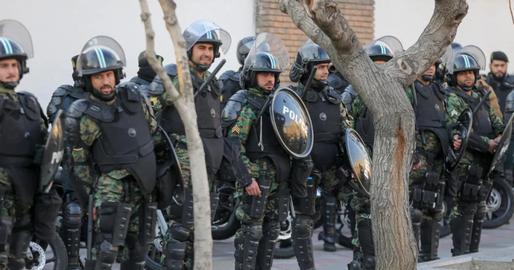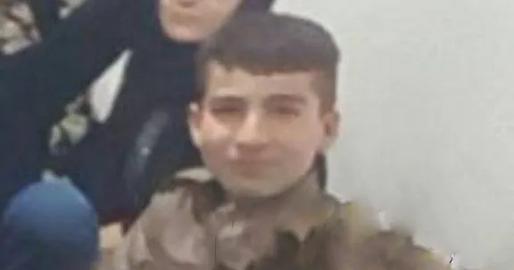Iran’s Special Units, or riot police, are the main force deployed in the streets to suppress the ongoing wave of protests sparked by the September death of 22-year-old Mahsa Amini in the custody of morality police. How do these agents of repression live? What do they say to their families? To find answers to these questions, we spoke to the wife of a Special Units member whom we called Khosro to protect their identities.
How are you doing these days?
“First, let me tell you that we pray to God for this situation to end. We too want to have a better life and be free. But we have been trapped because this is Khosro’s job. I swear to God, had I known five years ago that we would be in this situation I would have asked him to change his job, or I wouldn’t have married him.”
“These days his nerves are shattered, and our life has become more difficult. The moment he arrives home he starts grumbling that something happened and that a commander called and cursed him, and so on. Soon after the unrests started, a soldier at Eslam Shahr barracks [near Tehran] killed himself. He shot himself. All the members of the unit were reprimanded. The poor soldier had arrived at the barracks only two weeks earlier. Khosro saw his body and has since felt horrible.”
“Then he became angrier day by day. Every day he says the colonel cursed him, that they refused to grant somebody a leave of absence, that he quarreled with others, that they complain against each other, and so on and so forth. He brings all these things home. All the time he says: ‘I am fed up, my nerves are gone, I am tired, I haven’t had lunch.”
These things happened over the past two months?
“Yes, because even when they aren’t on a mission, they keep them in the barracks from morning to night and they do not let them go to their wives and children. Then, when the new month arrives, they say they won’t pay overtime to those who were on alert but were not sent to the streets -- people who were at work from 7 a.m. until midnight, away from their families.”
Didn’t they announce that salaries in the security forces have increased by 20 percent?
“Where is it? We have yet to see it […] In normal times, they would be off work earlier on Thursdays and Mondays, which police call “family days.” But now they keep them until midnight. Every day. Even on Fridays they drag them there.”
Are they exhausted?
“Yes, very exhausted. They are all nervous […] Khosro shouts so much over there that it has become a habit. Even at home, the way he talks disturbs us a lot. They call from work all the time, and he quarrels with them loudly. He says that many of his colleagues have nobody here. Their wives are pregnant, and they have small children. Then, when they are put on alert, they cannot do their second jobs. They have to pay a rent or mortgages, and have 1,000 other expenses. Khosro’s second job is to sell things on the Internet, but now he cannot do it and he is very upset. And I am all alone at home with a newborn baby. If he gets sick, I have to take him to the doctor or the clinic all by myself. What if I come down with Covid and get sick? Who would come to my aid? When I went to the clinic, a few people were looking at me in a very bad way. I was frightened and hid my insurance booklet.”
But your insurance booklet does not say you belong to the police or to the Revolutionary Guards…
“No, but I felt that everybody was looking at me in a very unfriendly way. I feel uncomfortable because I myself know what my husband’s job is. And I saw a lot of bad things on the Internet as well. For example, a drugstore or supermarket posted a notice saying they weren’t selling anything to the police or the Revolutionary Guards.”
“Last month, somebody hit an officer with his car and then got off the car and stabbed four or five of Khosro’s colleagues with a knife. They had to take them to hospital in a private car. One of them said that everybody at the hospital was cursing them and looked at them as if they were murderers. He told them: ‘We are powerless!’ They themselves say that they are no longer safe.”
What’s the difference from previous protests?
“In 2019 (eds: during November 2019 protests), Khosro did not come home for a whole month […] I took clothes and food for him to the barracks. But now they let them go home at night because they are very nervous and exhausted.”
“Every other day they have a videoconference because, for example, some colonel wants to talk to them. The speeches are repetitious and ridiculous, and it exhausts them even more. Some commanders told them: ‘Please, please do not shoot people if you can avoid it. Disperse them with teargas and water cannons. Our reputation is in tatters. The Revolutionary Guards and the [paramilitary] Basijis wear outfits with police insignia and kill people. Find out who they are.’”
“They said that they have detained a few plainclothesmen who had altered their paintball guns and were shooting at people with plastic bullets. The Special Unit commander was very angry and said in the meeting: ‘The plainclothesmen have disgraced our uniforms and people curse us because of their behavior.’”
Is it true that security forces use ambulances to move from place to place?
“They use everything, everything! Of course, many of them are either afraid or have a little bit of conscience and don’t do bad things. They once sent my husband in civilian clothes to identify people, meaning to snitch on them. I have never told this to anyone, not even to my parents who are my confidants. Khosro says that when they were patrolling, the Basijis came, grabbed three or four girls and wanted to put them away in the car but people did not let them. Khosro says: ‘We didn’t do anything. We did not help the Basijis either.” But then one of his colleagues who was dressed in baggy pants and looked like a regular young guy came and talked to some people. The following day, they arrested those people. I told Khosro: ‘Don’t come back home if you ever do such a thing.’”
How are things right now?
“They are no longer on alert every day. They have been ordered to fire less tear gas and to use plastic bullets and smoke grenades. But they say that the Basijis have arrested many people. Recently [Khosro’s] commanding colonel told the police deputy commander: ‘Set the economy right and stop making people angry and we would end the riots. When I see these young people have no jobs and no income, how can I shoot them?’”
visit the accountability section
In this section of Iran Wire, you can contact the officials and launch your campaign for various problems

























comments